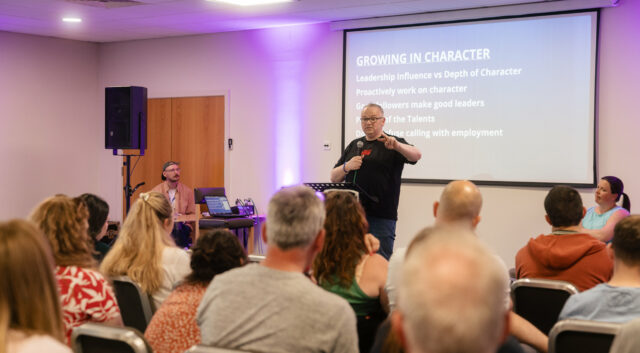John Mumford looks at the biblical principle for resolving conflict, with practical examples.
If you’ve been in the church for any period of time, you must agree that Mr and Mrs Average will, at some point, have a conflict. It’s inevitable. Well, you say, “John, why is that, and aren’t you being pessimistic?” I don’t think so, and would like to address conflict, why it occurs, and what our responsibilities are when we see it face to face.
To begin with, conflicts in the church arise because the Bible says so. Jesus’ words in Matthew 18:20 could have been easily rewritten from “for where two or three have come together in my name, there am I with them” to “for where two or three have come together in my name, there will be four or five different opinions.” Isn’t that right? Have you ever noticed how many times the Bible talks to Christians about forgiving one another, bearing one another’s burdens, or speaking the truth to each other? Why do you think that Paul so often spoke of unity in his letters? Probably because we needed to hear it.
Even “Godly Christians” living in this fallen world, are fallen men and women, and are also subject to conflict. You see this throughout the New Testament. There’s one occasion where the Apostle Paul had a huge issue with Mark. . This was a sharp disagreement (which is a polite word compared to what was originally written in the Greek). They didn’t necessarily come to blows, but neither were in any way ambiguous about their thoughts. You might also recall the issue in Luke 9 where the disciples were caught in an argument. Jesus’ chosen leaders were caught arguing about which one of them was the greatest. There are dozens of other examples. So whether a super Christian like the twelve, or just a regular Christian like you and I, conflict is inevitable.
The second reason conflicts happen is because they arise out of our differences. Put simply, two people being together, if given enough time, will disagree on something. In a new marriage come two different perspectives, two different temperaments, two different emphases, two different backgrounds, two different personalities, two different sets of feelings. What is true in a marriage is also true in a church or housegroup. It’s just a little more complicated in that there are only two in a marriage and twelve in a house group.
Conflict is inevitable
Thirdly, conflicts arise because we have similar weaknesses. Have you noticed how often it’s people’s weaknesses and sins that irritate you the most? Often because they’re very close to your own. You see yourself in them and that gets to you.
Finally, conflict happens because the kingdom of darkness exists. The ultimate reason is because of the fall of man and the tussle between God and Satan. We see this from the beginning of Genesis to the end of Revelation.
In Philippians chapter four, Paul deals with a conflict between two individuals: Euodia and Syntyche. These women, who were probably leaders in the church, were urged by Paul to “agree with each other in the Lord” (Phil. 4.2). In this story, the basis of Paul’s convictions on conflict are unveiled and, I believe, are the basis we should hold to whenever conflicts arise, whatever the context of the conflict might be.
Let’s talk first about when a conflict arises and you are not personally involved. Assume that as you turn up to your house group on a Thursday evening you see two people who are clearly at loggerheads. So in this situation you have not offended anyone, nor have they offended you, but it’s just of couple of people going at each other. In this situation I want you to note the example of Paul as he addressed Euodia and Syntyche. He urges them to work out their differences. He even calls alongside some of his friends. “Yes, and I ask you, loyal yolkfellow, help these women who have contended at my side in the cause of the gospel…” (Phil 4.3). In other words here are two women who have a conflict, now you fellow workers should help, if at all possible, to sort it out.
The world wages war. Individuals, too, wage war. The church, Paul says by contrast, should wage peace. We are called to proactively wage peace. Think of it this way: as a Christian, God has given you two “buckets” which are at your very disposal. One is filled with water, and the other is filled with petrol. In any given situation you have a choice as to which bucket to throw. In the case of the couple at housegroup, a choice is being given as to which bucket will be lobbed in their direction. Depending on which bucket is chosen, the situation will be stopped cold, or set ablaze.
So when you see little relational disputes bubbling, or little fires starting between friends, you can come along and throw a great bucket of water over it. But you could also come along just as easily with your bucket of petrol, throw it on, stand back, and admire the flames. This, however, is sin.
It is equally true that the water bucket could be used in the wrong circumstance. Again assume you turn up at your housegroup and there’s a couple talking, very excitedly, because the spirit of God has spoken to them through a prophetic word or a scripture. In this they feel that God has given them a definite leading about their future. Again, which bucket are you going to use? The Englishman tends to reach for the bucket of cold water. “Oh that will never work and by the way, you’re rather proud even to think that God would use you like this because we’ve tried it before and it didn’t work.” On the other hand you could grab your bucket of petrol and say, “How wonderful let’s pray for you.”
A last temptation is to use neither bucket but to hide both of them and say things like “Am I my brother’s keeper?” We could choose to think, “That’s their business and I don’t want to interfere in their affairs.” Sometimes we do worse than that. We might secretly be happy that the two of them are fighting. It keeps the heat off us for the time being. And sometimes we simply enjoy other people’s pain. I have two brothers, and there were occasions when my elder brother and younger brother were caught by our parents, doing something wrong. On those rare occasions when I was not involved… I loved it! We often enjoy other people’s pain, and rather enjoy seeing them squirm.
So how are we to diffuse these situations where we are not involved personally? Without becoming parental or thinking of yourself as being responsible, go to the person gently saying, “I can see the situation you’re in is difficult, yet I know that you both could work it out.” Just exhort and encourage in love. Of course, I’m not saying you should become part of the problem; but do pray and try to encourage a solution. I’ve done it dozens oftimes.
It is important to notice the way Paul speaks not as an interferer, but as a lover. In Philippians 4.1 he says “Therefore, my brothers…” He’s associating himself with them even though they are going through difficulties. He’s not distancing himself, he’s associating himself with them and saying “You whom I love, you whom I long for, my joy and my crown…” I know this language might sound a bit stilted in English, but there’s real tenderness there! And by using this approach, these situations could be easily stopped.
Let’s now deal with situations where we’re involved personally. Assume that someone has offended you and you are, as it were, the innocent party. Assume also that the offence is clearly inadvertent, and more of an annoyance. You don’t like the way they dress, or talk, or their general demeanour toward you. It might even be that they put milk in their tea before they pour the water in, whereas you’ve always put milk in after. Then they proceed to lecture you on how their method really is the only way to make tea. You know the type. I have a couple of filing cabinets in my study, and in the bottom drawer on the right hand side there’s a file labelled “TNN.” (It’s quite a fat one actually.) It stands for TAKE NO NOTICE! In these situations, I suggest that you open your own TNN file. We should always have one opened up in our hearts to just accept the fact that people might be annoying from time to time and, in these circumstances, we have no ground to confront them.
Now let’s assume someone has clearly done something which injured you. Do you think you now have sufficient reason to confront them? Wait one minute first and ask this one crucial question: Was their action made out of their weakness, or out of true wickedness? My council is if they’ve offended you because of their own weakness, you don’t have a sufficient reason to go to them. Paul says in Romans 15.1, “We who are strong ought to bear with the failings of the weak…” Eventually, there will be times when people’s weaknesses will offend you. They might be lacking in social skills and say something in a group and you’ll think, “What!” On those sort of occasions, to use an American phrase, you simply suck it up. By this I mean you just extend to them forgiveness because they’re not meaning to offend. Often the more you stand back and think about it, the more you realise that the action was not deliberate. The person might have been struggling with a difficult emotional situation, or perhaps even a physical difficulty you didn’t know about. Many conflicts arise not out of overt sinfulness or wickedness, but out of our own weaknesses — “people doing people stuff.” In these instances, I think the Bible calls us to extend spiritual generosity.
Another situation where we are to refrain from confrontation is where the issue is based on a matter of personal judgment—it’s not about a specific sin or a specific offence. You know those situations where you might think, “I’m struggling with the nose-ring Steve wears, and I have a major problem with that.” Or, “God is convicting me about the amount of time Mary spends watching TV.” Quite frankly, it’s none of your business. It’s a matter of private judgment how people spend their money, or choose to dress. If they want to go skiing, God bless them, let them go skiing. If they want blue hair, let them have blue hair. If they wear clothes which don’t match, that’s their choice. We all have these chips on our shoulders along with a silly tendency to share them with others. But this is not godly. Get some prayer for your chip, and get God to take it away.
We are all part of Christ’s body. We are called to wage a war of peace and, by doing 50, we will promote unity to those around us. In my next article, I will deal with another aspect of conflict: how to confront someone when they have sinned against you.









